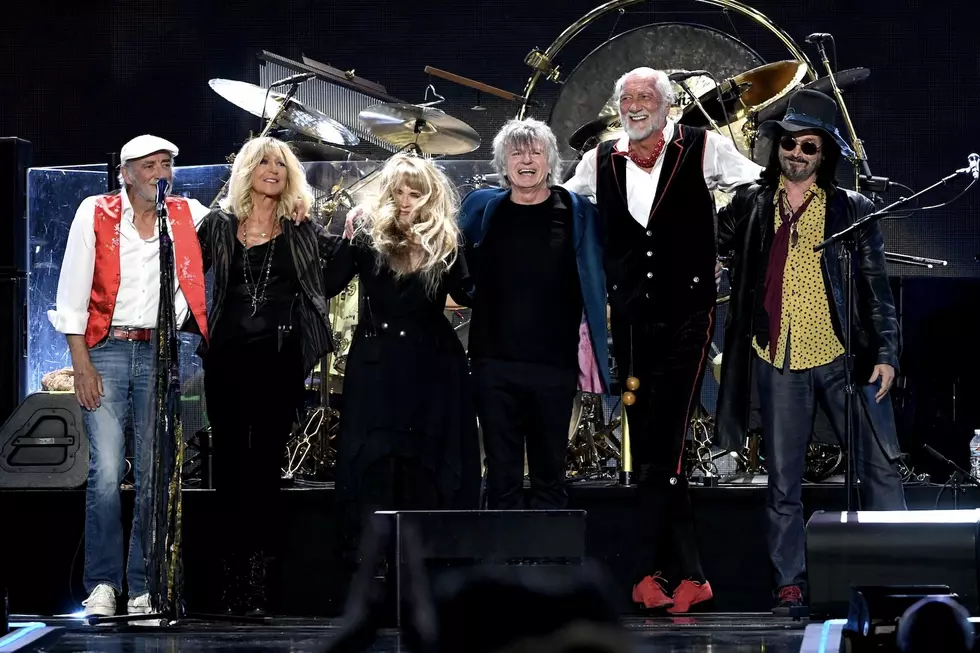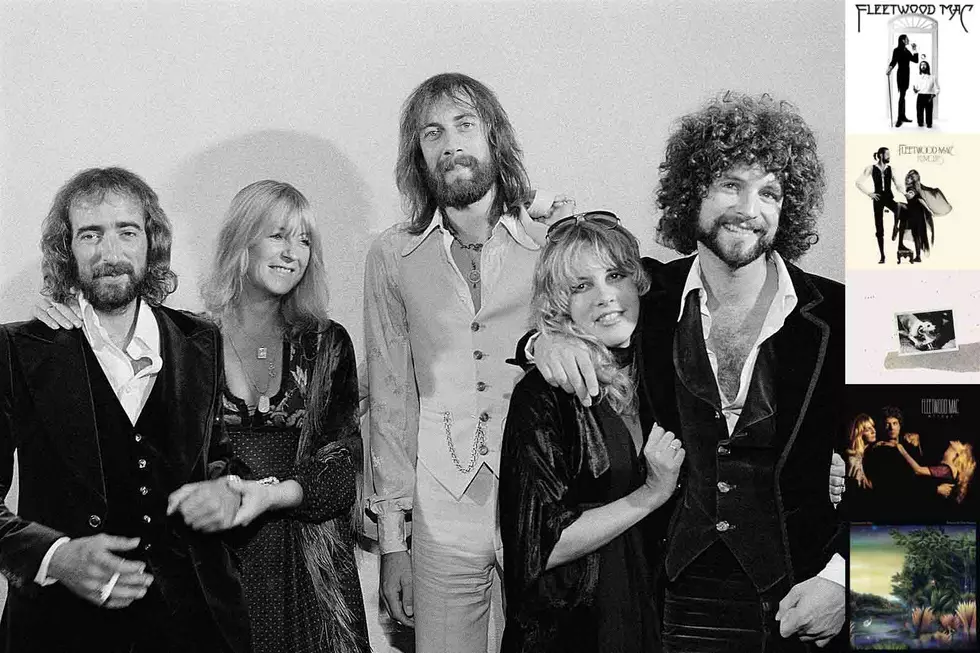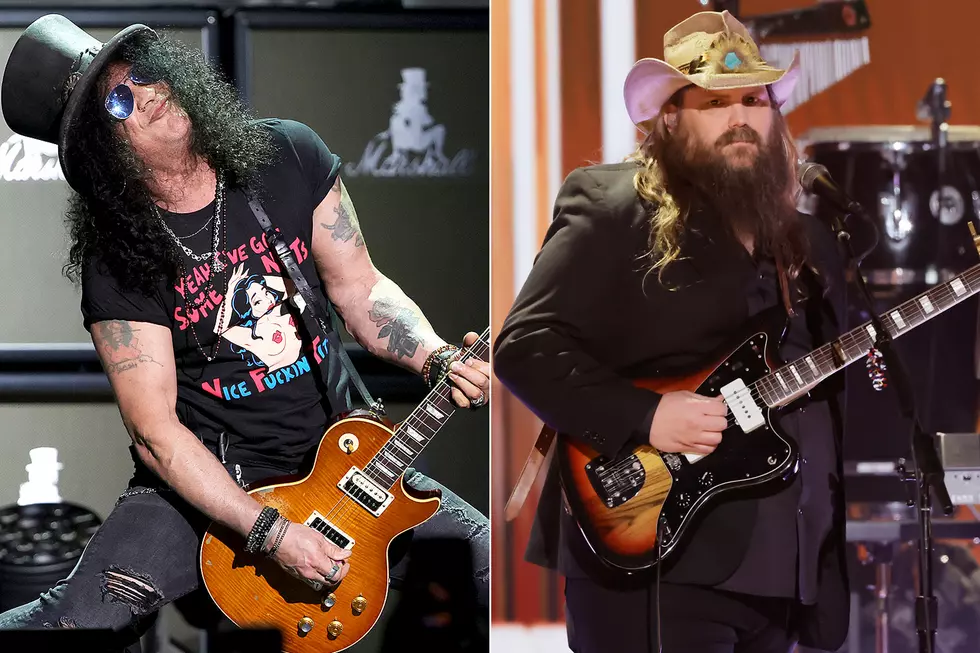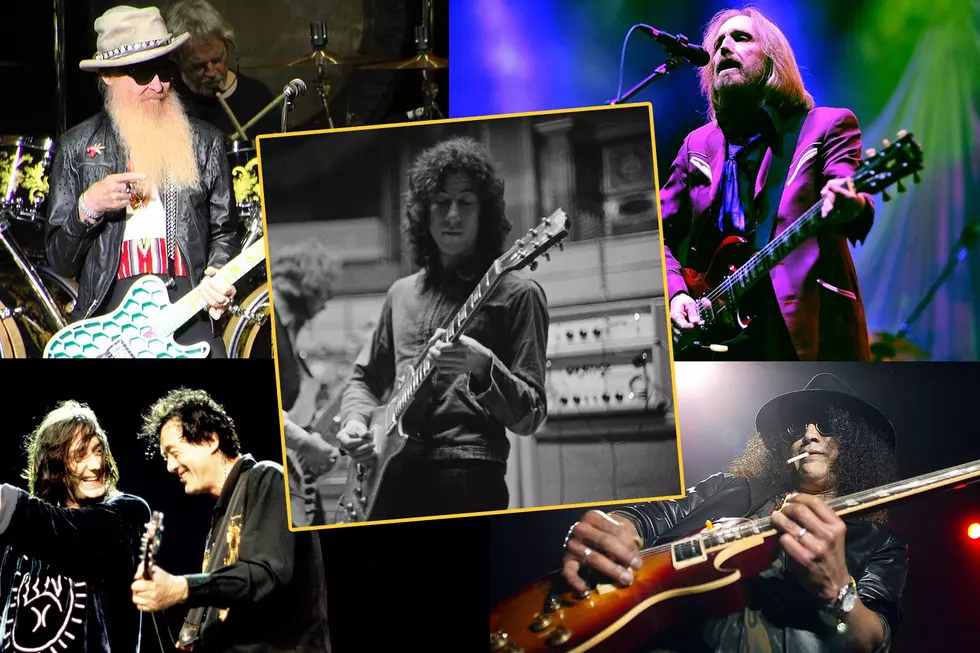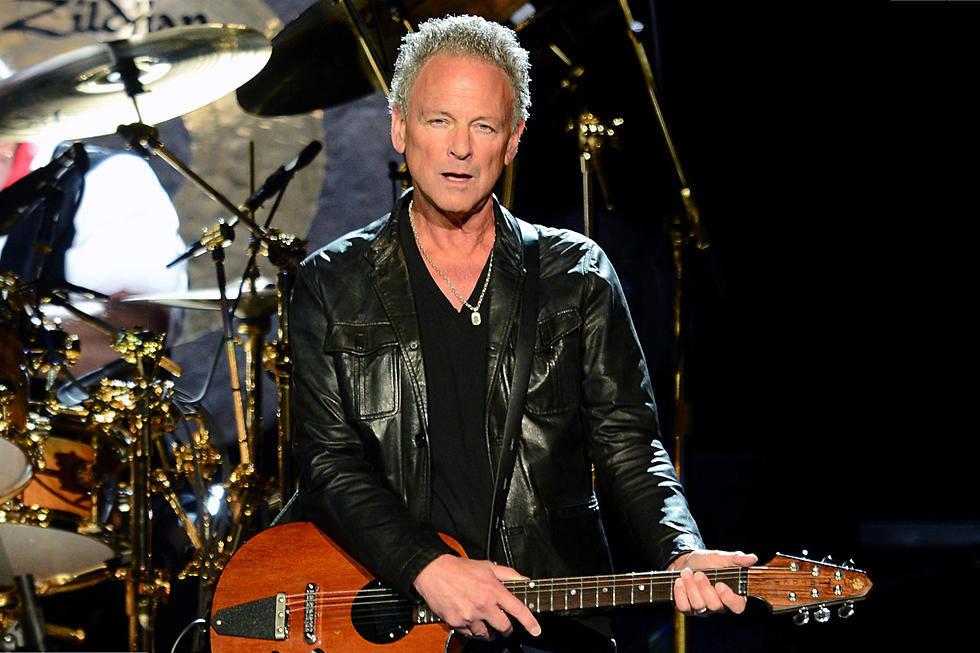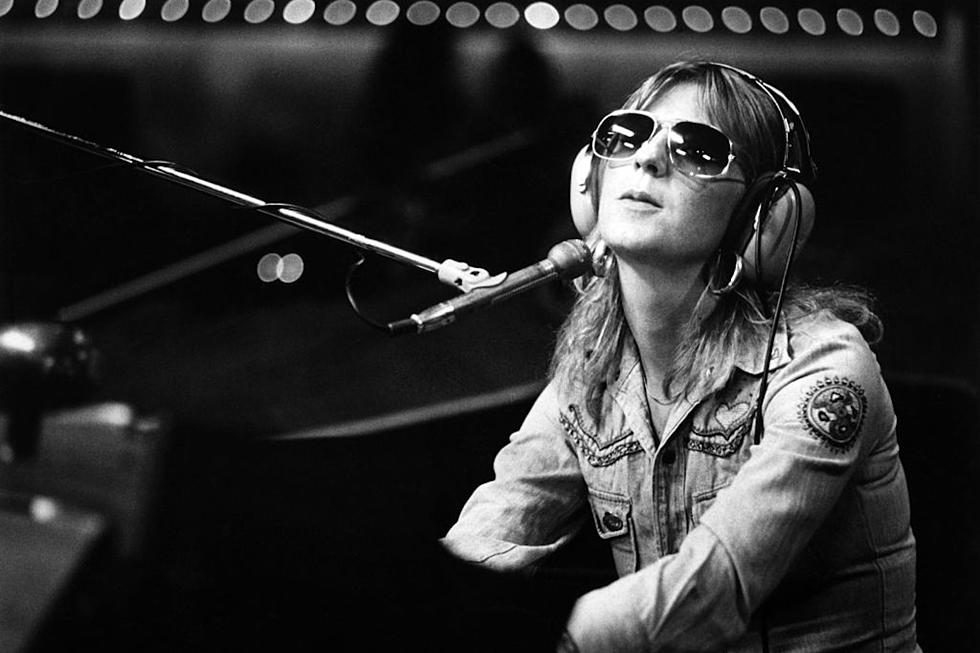
Fleetwood Mac’s 22 Most Historic Concerts
With a 50-year history and more than a dozen lineup changes, Fleetwood Mac's various musical transformations have been played out on stages all over the world. We're taking a look at their most historic concerts below.
You'll learn about the times they've had to introduce new members, or the last time the musicians played with the band. While most of them have taken place at the beginning of a tour, on a handful of occasions they've had to make changes while on the road, including one time when a former member stepped in for a few weeks. And in one case they even had a group of pretenders claiming to be them.
Any or all of these could have sunk lesser bands, but Fleetwood Mac have persevered throughout the decades. Read all about it below.
Aug. 13, 1967: National Jazz and Blues Festival, Royal Windsor Racecourse
Listed as Peter Green's Fleetwood Mac and consisting of guitarists Green and Jeremy Spencer, drummer Mick Fleetwood and bassist Bob Brunning, the group made their live debut by performing on the closing night – dedicated to blues – of Britain's National Jazz and Blues Festival, an evening headlined by Cream and Jeff Beck. Despite the band's name, bass chores were actually handled by Brunning because bassist John McVie was still in John Mayall's Bluesbreakers, who also played that night.
Sept. 5, 1967: The Marquee, London
After Fleetwood Mac played a few shows with Brunning, McVie saw the light and left the Bluesbreakers. His first gig with them took place at the Marquee in London's Soho district. The club is one of the most celebrated in rock history, having seen virtually every major British blues-based band of the '60s cut their teeth on its stage, including the Rolling Stones, the Who and the Yardbirds.
Aug. 14, 1968: Nag's Head, London
Fleetwood Mac added a fifth member when Danny Kirwan signed on as a rhythm guitarist. He made his debut at the Nag's Head, a fitting place because Kirwan, who was obsessed with Green's virtuoso playing, often saw them there. "He used to come hang at the Nag's Head in Battersea, which is where we played a lot," Fleetwood said. "He would always be sitting in the front row, staring."
May 28, 1970: The Roundhouse, London
While touring Germany in March 1970, Green and Kirwan were befriended by a group of hippies who lived in a Munich commune. Already in the midst of an acid-fueled spiritual crisis, Green decided that night to leave the group at the conclusion of the tour. Their last show was at the Roundhouse, a former maintenance facility for trains that had been transformed into a concert venue a few years earlier.
Aug. 1, 1970: Warehouse Cafe, New Orleans
Christine McVie, the wife of bassist John McVie, had already contributed keyboards, backing vocals and the album cover artwork to the recorded-but-not-yet-released Kiln House when she was asked to join the band. Prior to that, she had been in Chicken Shack, another band on the British blues scene that often opened up for Fleetwood Mac in their early days.
Feb. 14, 1971: Fillmore West, San Francisco
Jeremy Spencer's tenure in Fleetwood Mac ended abruptly, when the band were in the midst of a U.S. tour. After a few nights at the Fillmore in San Francisco, they headed to Los Angeles for a few more at the Whiskey A Go-Go. While out on a walk on the afternoon before the first show, Spencer was approached by members of a religious organization called the Children of God, who took him back to their commune. Not knowing the whereabouts of their guitarist, the band were forced to cancel the concert. They discovered Spencer a few days later, and he informed them that he was not returning. After spending the next month as a quartet, Green rejoined for the last three weeks.
May 31, 1971: Pinkpop Festival, Geleen, Netherlands
A transition from British blues-rock to pop began when they hired Bob Welch, a Los Angeles-born singer, songwriter and guitarist who'd already had an album out as a member of Head West. Fleetwood Mac decided to test out the new lineup on stage before they went into the studio to record Future Games. The first show took place at the second annual Pinkpop Festival in the Netherlands; a tour of England immediately followed.
Aug. 31, 1972: Gaelic Park, Bronx, N.Y.
Once again, Fleetwood Mac lost one of its own in the middle of a U.S. tour. The relationship between Kirwan and Welch was already strained before they got into an argument about tuning a guitar minutes before a gig. "Kirwan smashed [Welch's] head against a wall, then took his Les Paul guitar and broke it to pieces, refusing to go on-stage with the band," according to a fan site. "Instead, he sat at the sound board and watched the band flounder through the show, and went so far as to negatively critique it afterwards." Kirwan was fired that night.
The precise date of this concert has been lost to history. A bootleg exists of a Aug. 31, 1972 show supporting Deep Purple, however, and Kirwan was still part of the lineup at that point. It's been widely reported that guitarist Bob Weston and singer Dave Walker were hired to replace him in September.
Oct. 23, 1973: Lincoln, Neb.
The experiment as a sextet with Walker, whom they knew from his days touring with Savoy Brown, didn't last long. He barely contributed to 1973's Penguin and was gone by June. Weston played on a second album they released that year, Mystery to Me. But shortly thereafter, Fleetwood learned that Weston was having an affair with his wife, Jenny. Following a show in Lincoln, Neb. (the venue is unknown, although Setlist.fm puts it at the Pershing Center, with no other information), Weston was fired and the band continued as a foursome with Welch, Fleetwood and the McVies.
Jan. 18, 1974: Warehouse Cafe, New Orleans
After Weston's firing, the band called off their 1974 tour so that Fleetwood could attend to his personal issues. The decision angered manager Clifford Davis, who put together a different band called "Fleetwood Mac," although none of them had ever been in the band. He sent them out on the road, beginning in New Orleans. An injunction forced the imposters off the road by April, and Fleetwood and McVie sued for the rights to the band name – which, of course, was their own – and won.
Dec. 2, 1974: Long Beach Municipal Auditorium, Long Beach, Calif.
Welch stepped up on 1974's Heroes Are Hard to Find, penning eight of its 11 tracks. But the previous three years had taken a toll on the guitarist. The subsequent tour saw engineer Doug Graves and later Bobby Hunt unofficially join the group on keyboards, and when it concluded in Long Beach, Calif., Welch left the band.
May 15, 1975: El Paso County Coliseum, El Paso, Texas
Mick Fleetwood was played an album by Lindsey Buckingham and Stevie Nicks by engineer Keith Olsen while listening to demos at Los Angeles' Sound City Studios. Impressed, Fleetwood offered Buckingham the job of Welch's replacement, but the guitarist insisted that Nicks, his girlfriend and an accomplished songwriter, join the band with him.
The deal was made official on New Year's Eve 1974, and they went to work on Fleetwood Mac. As they did five years earlier, Fleetwood Mac debuted an updated lineup before their new album was on record store shelves. By the time the tour ended on Aug. 30, 1976, they had the No. 1 album in the U.S.
Oct. 31, 1982: Frank Erwin Center, Austin, Texas
For a band synonymous with instability, the fact that this lineup stayed together even after their internal relationships had disintegrated – and become part of rock legend – was both miraculous and somewhat ironic. Following Fleetwood Mac, they recorded and toured the world behind Rumours, Tusk and Mirage. But after the release of their fifth album together, 1987's Tango in the Night, Buckingham quit, citing a desire to return to a solo project. The last date of the Mirage tour, five years earlier, turned out to be the final show for the "classic" lineup. At least for a while.
Sept. 20, 1987: Kemper Arena, Kansas City
With the tour already in the planning stages, the band had to find new people quickly. As they did when Kirwan was fired and Welch left, Fleetwood Mac needed two people to replace Buckingham. They recruited guitarists Billy Burnette – a member of Fleetwood's Zoo side project – and sessions veteran Rick Vito and hit the road. The Shake the Cage tour was another globe-trotting affair, beginning in Kansas City in September 1987 and continuing through the end of June in Manchester, England.
Dec. 7, 1990: Great Western Forum, Inglewood, Calif.
Burnette and Vito were retained for the band's next effort, 1990's Behind the Mask. Another lengthy arena trek followed, beginning in March, but changes were again afoot. Christine announced that she would continue to record with the band, but decided she was tired of the road. Meanwhile, Nicks and Vito left upon the tour's conclusion. Their final stop at the Forum saw Buckingham sitting in on "Landslide," "Go Your Own Way" and "Tear It Up," just as he had done the previous night in Oakland.
Jan. 19, 1993: Capital Centre, Landover, Md.
During the 1992 presidential campaign, Bill Clinton used "Don't Stop" as his theme. For his nationally televised gala concert on the evening prior to his inauguration, the classic quintet got back together to perform the song. Buckingham remained adamant, however, that the reunion wouldn't go beyond that night. "I didn’t feel overly connected to any of it, really. It was short and sweet,” he said.
“There were a lot of questions about whether this suggested a long-term reunion, and those were quickly put to rest by me," Buckingham added. "And that was it.” Christine McVie later echoed those sentiments: “It was a one-off thing, and I don’t think anyone thought much beyond that show. At the airport as we left to come back to L.A., it was pretty much, ‘Well, see you around…’”
July 4, 1994: Zilker Park, Austin, Texas
The band's namesakes regrouped yet again, complementing themselves and Burnette with former Traffic guitarist Dave Mason and Bekka Bramlett, the daughter of Delaney and Bonnie Bramlett. During sessions for the record, they made their live debut at a Fourth of July concert in Austin and soon went out on the road opening up for Crosby, Stills & Nash. The shows, as Fleetwood said, "gave everyone a bit of confidence, especially Bekka, who is an unknown quantity."
The next summer, they hit the road with REO Speedwagon and Pat Benatar, concluding on Sept. 1 at the Aladdin Theater in Las Vegas six weeks before the release of Time. The album sank quickly, and then Christine's announced she was leaving entirely. Fleetwood Mac, now reduced to only Mick Fleetwood and John McVie, broke up.
May 23, 1997: Warner Brothers Studios, Burbank, Calif.
Two years later, the classic lineup returned for their first performance in 15 years. Recorded as an episode of MTV Unplugged and released as The Dance, the concert included their greatest hits as well as one new song by each of its principal songwriters. "Silver Springs," originally the b-side of "Go Your Own Way" became the set's hit single. A North American tour followed, beginning at the CT Meadows Amphitheatre in Hartford, Conn., on Sept. 17, 1997.
Nov. 30, 1997: U.S. Airways Arena, Landover, Md.
The reunion tour was a massive success, but once again Christine decided to leave the band after the final date, at the U.S. Airways Arena in Landover. Fleetwood Mac carried on without her for world tours in 2003-04, 2009 and 2013.
Sept. 30, 2014: Target Center, Minneapolis, Minn.
When Fleetwood Mac's 2013 tour hit London, Christine sat in with the band on "Don't Stop." A few months later, she was back in the band. "I had some deluded idea that I wanted to live the 'country lady' life," she said. "But I felt isolated in the country. I grew quite ill and depressed." On the trek's opening night in Minneapolis, Buckingham called it "a beautiful, profound, poetic new chapter now that this lady is back with us. And it’s a chapter that is going to go on for a while. A chapter that is going to yield much fruit. We are very, very excited."
July 30, 2017: Citi Field, New York, N.Y.
Fleetwood Mac only played a pair of dates in 2017, the Classic West and East shows that took place at Los Angeles' Dodger Stadium on July 16 and New York's Citi Field two weeks later. They ended up being historic, as Fleetwood Mac topped a second-night bill that also featured Journey and Earth, Wind & Fire. Classic East and West initially garnered headlines for being the first shows by the Eagles after Glenn Frey's death. In retrospect, however, they also turned out to be the last full-length concerts featuring the quintet of Fleetwood, Nicks, Buckingham and the McVies.
2018: Radio City Music Hall, New York, N.Y.
On the eve of the 2018 Grammys, Fleetwood Mac were awarded the MusiCares Person of the Year Award. The evening featured a new generation of musicians performing Fleetwood Mac classics, and then they were introduced by Bill Clinton. "They let me use it as a theme song and I have been trying to live by it ever since," Clinton told the audience at Radio City Music Hall in New York. "I owe a great deal to all of them." Fleetwood Mac performed five songs, "The Chain" (with Harry Styles), "Little Lies," "Tusk," "Gold Dust Woman" and "Go Your Own Way."
Four of the five members wanted to go back out on the road but, as in 1987, Buckingham was less-than eager. So they replaced him with Mike Campbell from Tom Petty and the Heartbreakers and Crowded House frontman Neil Finn, announcing a tour to begin in October 2018. The new lineup premiered in early September, singing two songs on The Ellen DeGeneres Show.
More From Ultimate Classic Rock
